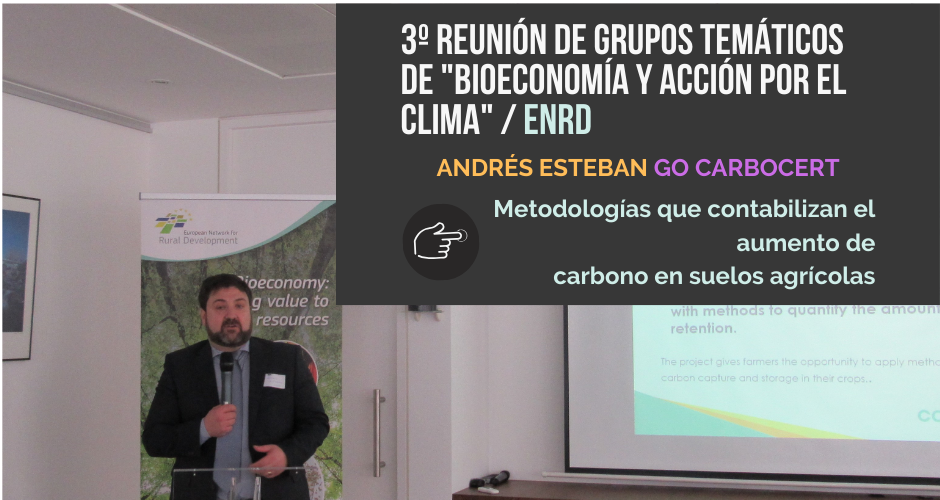
01 de April de 2020
04/01/2020. The National Rural Network actively participated in the 3rd meeting of the Thematic Group on "Bioeconomy and Climate Action in Rural Areas," presenting to Brussels the conclusions of the studies carried out by the Spanish CARBOCERT Operational Group, which develops methodologies that allow accounting for the increase in carbon in agricultural soils and fixed and permanent structures resulting from the implementation of sustainable agronomic practices.
- The RRN provides methodologies that allow for the enhancement and certification of carbon increases in agricultural soils.
- The objective of this meeting of the Thematic Group led by ENRD is to discuss how to certify and demonstrate climate actions carried out in rural areas.
Thematic Group on "Bioeconomy and Climate Action in Rural Areas"
The objective of this meeting, organized by ENRD – the European Network for Rural Development – is to demonstrate and certify rural areas' efforts to mitigate and adapt to climate change, so that these actions are recognized by markets, authorities, and society at large. This requires certification systems, climate labels, etc.
The meeting's dynamic consists of a presentation of European policies by various related institutions and the presentation of practical examples developed in different European Union countries—through their own Operational Groups and Innovative Projects, LEADER initiatives, etc.—followed by a discussion on how to achieve these objectives.
Ultimately, it's about identifying the most appropriate ways to demonstrate the contribution of rural areas to climate action, as well as achieving sustainable and effective agronomic practices that contribute to climate change.
The National Rural Network featured a speaker from Andrés Esteban, from UNE (Spanish Association for Standardization) and coordinator of the CARBOCERT Operational Group. His presentation showcased the progress made in developing the guide to good agricultural practices , which focuses on increasing carbon sequestration in the soil and woody structures of six selected crops (wheat, grapevines, olive trees, almond trees, citrus fruits, and rice).
The presentation focused on the challenges encountered in developing a certification scheme for these same practices. It also highlighted the importance of harmonizing data collection procedures to provide a solid foundation for developing a certification scheme, as well as the support that standards (ISO 10694:1995 "Soil quality" and the draft ISO/CD 23400 "Guidelines for the determination of organic carbon and nitrogen stocks and their variations in mineral soil at plot scale") can provide.
You can find the conclusions of the 3rd meeting of the Thematic Group on "Bioeconomy and Climate Action in Rural Areas" at: https://bit.ly/3dUFdcu











